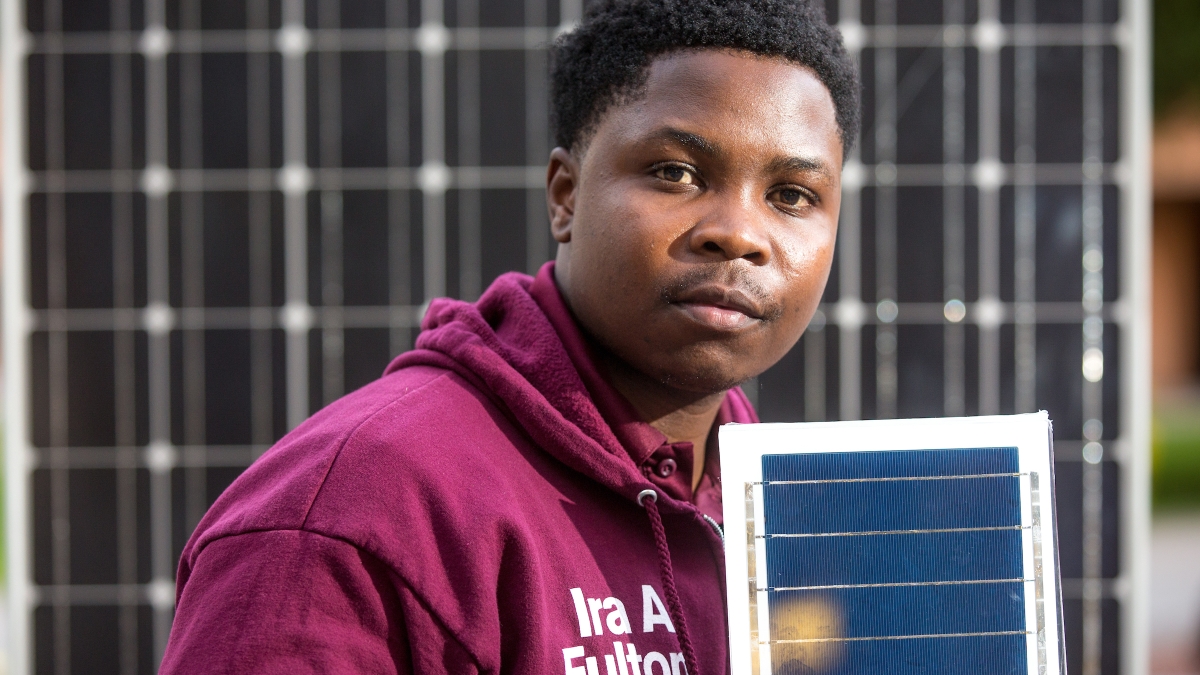When Ngoni Mugwisi was growing up in central Zimbabwe, the end of the day sometimes meant the end of his studies.
“Having consistent power cuts meant I could not study beyond the light of day, or I had to use candles for lighting,” said Mugwisi, an electrical engineering major and MasterCard Foundation Scholar at Arizona State University.
Without power, little problems turn into big problems. Ideas for solutions to problems just remain ideas.
Mugwisi is on a mission to bring power to his southern Africa home. And — armed with a newly awarded Rhodes Scholarship to study at Oxford next year — he is well-positioned to accomplish his goal.
The Rhodes Scholarship is the oldest and perhaps most prestigious international graduate scholarship program in the world. It was established in 1903 by empire builder John Cecil Rhodes.
Each year two Zimbabwean Rhodes Scholars are selected on the basis of their intellect, character, leadership and commitment to service to join 81 other Rhodes Scholars from around the world at the University of Oxford.
Mugwisi is from Gweru, a provincial capitol in central Zimbabwe. His father worked for Zimbabwe Alloys, and his mother is a home maker. His siblings still study by candlelight.
“Growing up in Zimbabwe, like many students, I faced this challenge of power cuts,” Mugwisi said. “So what happens in Zimbabwe and many parts of Africa, every day the electricity is cut off. That is because of many problems with the generation and distribution of power. I was always inspired to solve that problem. A degree in electrical engineering would enable me to do that.”
Zimbabwe’s power grid suffers from a web of challenges, as Mugwisi called it, between aging infrastructure, a lack of investment and a lack of expertise.
“It was a huge hindrance for my education and for my life, in general,” he said. “I got to think about the broader implications. It wasn’t only my education that was being affected. Sectors such as health, manufacturing. It’s a huge problem that goes beyond the individual.”
Mugwisi will graduate in May 2017. In the fall he will begin studying for a master’s degree in engineering science. After Oxford, he would like to develop his skills by working in a professional environment at an energy company using renewables in Europe or the U.S.
After honing his skills, he plans to earn either a master’s degree in business administration or public policy.
Then it’s back to Zimbabwe to help build the nation with other committed young professionals.
“I would like to join the team of young people who are really passionate about developing Zimbabwe,” he said. “The challenge in Zimbabwe right now is there aren’t many opportunities where people can develop their skills. I do think as things change in the long-term, economically and politically, we’ll see a lot more young people go back to Zimbabwe. I see that happening for myself in the near future.”
Mugwisi said the transdisciplinary hallmark of ASU was inspiring.
“This opportunity to cross between disciplines, whether in engineering, entrepeneurship, and all the collaboration efforts I’ve found here at ASU, they’ve been really inspiring,” he said. “It’s an enabling environment to be the best anyone can do. ... It means I can do things I really like, and there isn’t a lot of limitations. I found it to be pretty flexible and pretty diverse in the opportunities to put your hand in many cookie jars and take advantage of that.”
When Mugwisi arrived at ASU, he dove right in, starting a student organization with other African students called Africa Rises to promote African culture and dispel myths about the continent. He actively leads on the region 6 board of the National Society of Black Engineers.
And he founded Solar Water Solutions, an initiative extracting ground water for wells using solar energy. In the summer of 2015, he went back home to build a well with a water wheel using solar panels to pump water. Most community wells in Zimbabwe are powered by hand.
“It was an opportunity to apply my passion for renewable energy systems,” he said. “Those things I would never have imagined for myself coming here as a freshmen in 2013. But ASU made that possible by creating an enabling environment where one can pretty much pursue their interests. ... It’s been a really good experience learning here at ASU, especially in the engineering school. I say that because I have had opportunities to apply myself beyond the classroom, and I’ve had the opportunity to interact with teachers and professors who are really passionate about seeing me develop.”
Top photo: Electrical engineering senior Ngoni Muwisi, from Zimbabwe, has earned a Rhodes Scholarship and will begin his Master's in Engineering Science at the University of Oxford next fall. Muwisi is studying solar energy and is working on his honor's thesis on the "Balance of System Cost Analysis of Tandem Solar Cells." Photo by Charlie Leight/ASU Now.
More Science and technology

Breakthrough copper alloy achieves unprecedented high-temperature performance
A team of researchers from Arizona State University, the U.S. Army Research Laboratory, Lehigh University and Louisiana State University has developed a groundbreaking high-temperature copper alloy…

4 ASU researchers named senior members of the National Academy of Inventors
The National Academy of Inventors recently named four Arizona State University researchers as senior members to the prestigious organization.Professor Qiang Chen and associate professors Matthew…

Transforming Arizona’s highways for a smoother drive
Imagine you’re driving down a smooth stretch of road. Your tires have firm traction. There are no potholes you need to swerve to avoid. Your suspension feels responsive. You’re relaxed and focused on…


